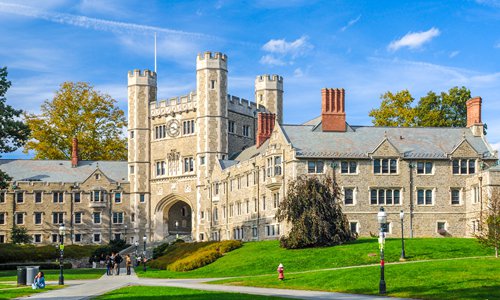HOME >> CHINA
US colleges worried over call to monitor Chinese scholars
By Dong Feng Source:Global Times Published: 2019/8/19 18:23:40

Princeton University based in New Jersey, the US Photo: IC
The Association of American Colleges and Universities and 21 other organizations signed a PEN America statement on August 12, in response to reports that the federal government has advised US universities to develop protocols for monitoring students and scholars from Chinese state-affiliated research institutions.
According to an NPR report on June 28, the FBI urged universities to monitor some Chinese students and scholars in the US.
The statement expressed concerns related to academic freedom, institutional independence, the principle of due process, and the privacy rights of students and faculty.
"As concerns on this matter grow, we advise universities to zealously safeguard their independence, maintain their commitment to academic freedom, uphold the principle of due process, and respect the privacy rights of students and faculty, whatever their national origins," the statement urged.
Xu Qiyuan, a senior research fellow at the Chinese Academy of Social Sciences, told the Global Times that in January 2018, the US Defense Department published a report on China's Technology Transfer Strategy, which included a section suggesting ways the US government could thwart technology transfer.
According to the report, three methods were listed: The Committee on Foreign Investment in the US, which governs foreign investment that could be used to transfer sensitive technology to adversaries; export controls, which are designed to prevent sensitive technologies or products from being shipped; and visas for Chinese foreign national students studying in the US, which are controlled by the State Department.
"The policy recommendations in the report were adopted by the Trump administration, which directly led to restrictions on trade, investment, technology and personnel exchanges in the past year," Xu said.
The intelligence departments, including the FBI, require US universities to monitor Chinese scholars and students. It is an upgrade of Chinese student visa management policy and an extension of China-US trade tensions to the scientific and technological field, Xu pointed out.
Voices heard
"The US' position as a global center for both technology and culture benefits a great deal from talents from all over the world, and the discriminatory policies carried out by the US government are obviously contrary to its long-term interests. Against such a backdrop, the joint statement issued by US universities and academic institutions reflect the rational voices of US society and the scientific community," Xu noted.
Yang Xiyu, a senior research fellow at the China Institute of International Studies in Beijing, told the Global Times that "US interference with Chinese scholars for political purposes is not only a serious disruption to normal exchanges between China and the US, but also undermines the national interests of the US."
"International practices show that any knowledge exchange is profitable for participating countries," he continued.
It is also an indisputable fact that China-US academic exchanges have benefited both sides since the reform and opening-up, Yang said.
Abnormal interventions
"Rude and irrational interventions by intelligence agencies on normal communication is hurting the US national interest," Yang said, adding that such interventions are absurd and very unfavorable to the development of China-US relations.
At the same time, the interventions trample on established principles in the US, such as freedom of academic exchanges, which is very abnormal in modern political history, Yang noted.
Asked if he thought the statement would have any effect on US policy, Yang said that he does not believe the move will get the US government to reverse its incorrect approach.
"At least the statement indicated the problem is getting serious, regardless of whether the voice of the academic community can influence the government's decision-making. If the US really values democracy, human rights and academic exchanges, policy makers need to note these concerns," Yang said.
Yang added that Chinese scholars involved in China-US academic exchanges should strictly abide by Chinese laws and those in their host countries.
"As long as they obey the law, there will be no excuse to challenge them," Yang noted.
Besides, no matter what policies the US government implements, China is prepared for further opening-up and is determined to be more active in academic exchanges than ever in the past 40 years, Yang added.
"Time will prove that China is correct. When the US begins to recognize the positive meaning of China's rise, the situation will certainly get better. After all, this unusual practice is not sustainable," Yang said.
Newspaper headline: Academic concerns
RELATED ARTICLES:
Posted in: IN-DEPTH,CHINA FOCUS